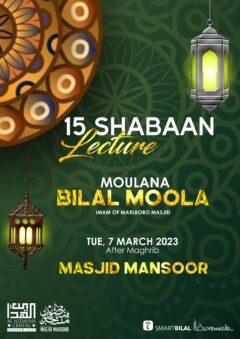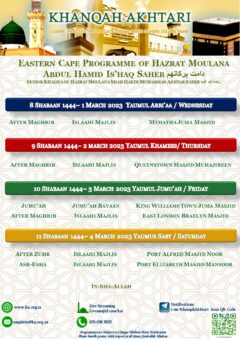from the Life of Prophet Musa alaihis salaam
Prophet Musa alaihis salaam was instructed by Allah Ta’ala to journey in search of Khidr alaihis salaam and attain knowledge. Some lessons that can be derived from this Quranic incident:
- Travelling in search of knowledge
The journey to seek knowledge and reach great heights will not be free of struggle and fatigue. Prophet Musa alaihis salaam undertook the tiresome journey with his companion Yusha bin Noon alaihis salaam with the sole intention of seeking the knowledge he needed from Khidr alaihis salaam. Musa alaihis salaam described this journey:
“We have suffered much fatigue in this journey of ours.” (Quran 18:62)
Ibn Mughal rahimahullah was a renowned writer in Islamic History. He kept travelling for 28 years in his search for knowledge. Hafiz Abul Qasim Sulaiman ibn Ahmed Tabarani rahimahullah spent 33 years of his life in the pursuit of collecting and verifying Hadith. In that period of time, he met and acquired knowledge from one thousand scholars. Ibn Maqarri rahimahullah once undertook a journey of eight hundred and forty miles for a copy of a valuable book that he needed.
Hasan al-Basri rahimahullah said “Nothing which Allah has created is greater, in terms of its reward, than seeking knowledge, neither Hajj nor Umrah [Lesser Pilgrimage], nor Jihad, nor Zakat, nor freeing slaves. If knowledge had a physical image it would be more beautiful than the sun, the moon, the stars, the sky, and a magnificent throne.” (The Heirs of the Prophets, Ibn Rajab Al-Hanbali, pg 35)
The rewards earned will be in proportion to the amount of struggle and fatigue that is patiently endured. The sweetness experienced after this patient endurance in the path of seeking knowledge is superior to any worldly pleasures, as Imam Muhammad ibn Hasan rahimahullah remarked: “Will the sons of kings ever experience such pleasure?” He said this after he spent the night in study and made a breakthrough in a difficult matter he was researching.
- Humbling oneself and being comfortable with seeking knowledge from those of a lesser rank or age
Being conceited about knowledge or status can lead to one’s detriment. Pride destroys ones knowledge in the same way that a flood causes utter destruction even in a high and lofty place).
The student must not be arrogant about his high level of intelligence, understanding and brainpower.
“That is the grace of Allah, which He bestows on whom He wills.” (Quran 62:4)
Each man is given only a drop from the vast ocean of knowledge. Even though his knowledge may seem plentiful to him, he need not be proud of it, but instead he must use it as a motivation to dive deeper into the oceans of knowledge throughout his life.
Linked to this point is the aspect of lowering ones pride to learn from those whom you might consider as lower than yourself in rank, status or age. The etiquette of acquiring knowledge is nothing but that the student should show respect for the teacher and follow him with eagerness to learn – even if the student happens to be superior to his teacher. Prophet Musa alaihis salaam was Kalimullah (the one who spoke to Allah). He was a high ranking messenger of Allah, yet he kept learning even after becoming a leader and did not consider it below himself to seek knowledge from Khidr alaihis salaam who was a pious servant of Allah.
- Striving hard
Almighty Allah says:
“As for those who strive hard in our cause, we will surely guide them to our paths.” (Quran 29:69)
Whoever searches for a certain thing and strives with effort, will most definitely find what he is looking for and whoever knocks at a door with persistence will make an entrance. Your desired goal will be achieved in proportion to the amount of effort you put in. If you need to learn something, the secret is to keep striving. This was the way of the Messengers, pious predecessors and learned scholars. Never allow laziness and despondency get the better of you even if this requires a long period of sacrifice and commitment. Prophet Musa alaihis salaam was determined to reach his goal and so he said to his companion, “I will not give up (travelling) until I reach the junction of the two seas or (until) I go on for years (a long period of time).” (Quran 18:60)
- Don’t impose on the teacher, be a decent student
Before blaming the teacher or the institution check yourself. It is incumbent on the student to instil in himself or herself lofty character, towards his teacher, institution, and fellow pupils. It is part of good manners that the student clearly informs the teacher of his intention and exactly what he aims to achieve from his studies.
Prophet Musa alaihis salaam informed Khidr alaihis salaam of his intention of seeking the special knowledge that Allah had bestowed him with and he politely asked, “May I follow you so that you teach me something of the knowledge which you have been taught?” (Quran 18:66). He also pledged to Khidr alaihis salaam that he will be humble and patient and strive to give off his best. Musa alaihis salaam said: “If Allah wills, you will find me patient, and I will not disobey your command.” (Quran 18:69)
Adapted from article by Rayyan Institute











COMMENTS